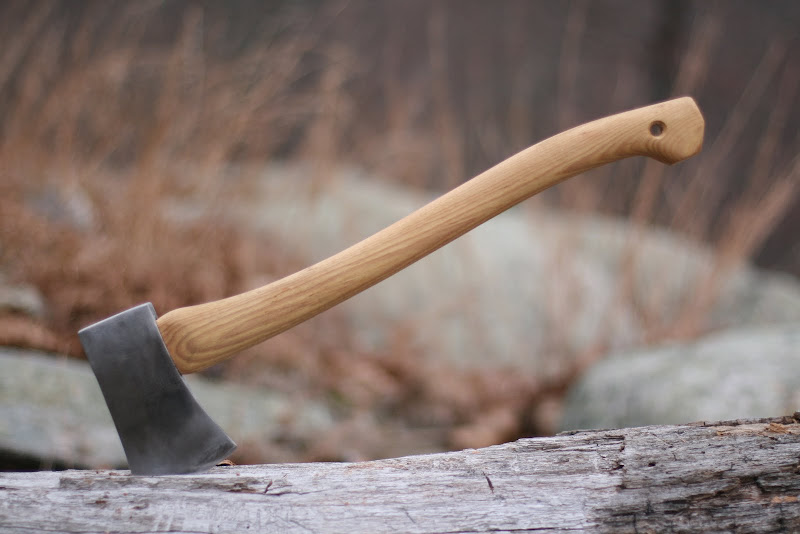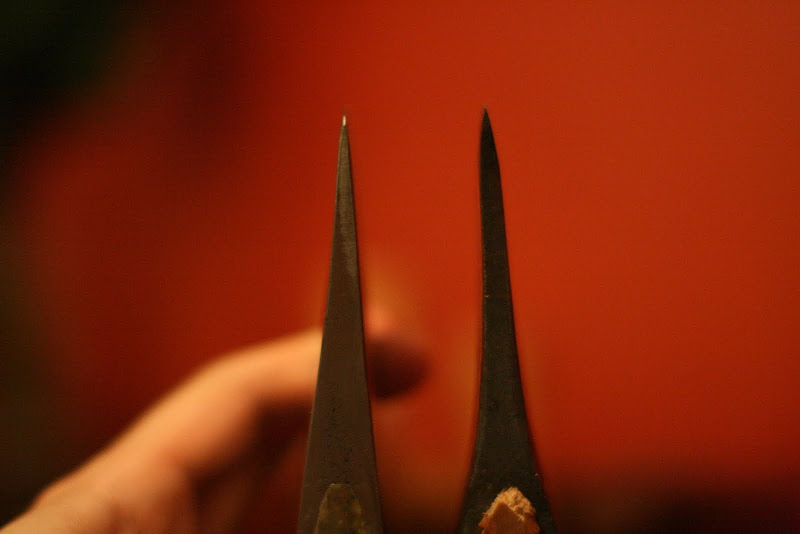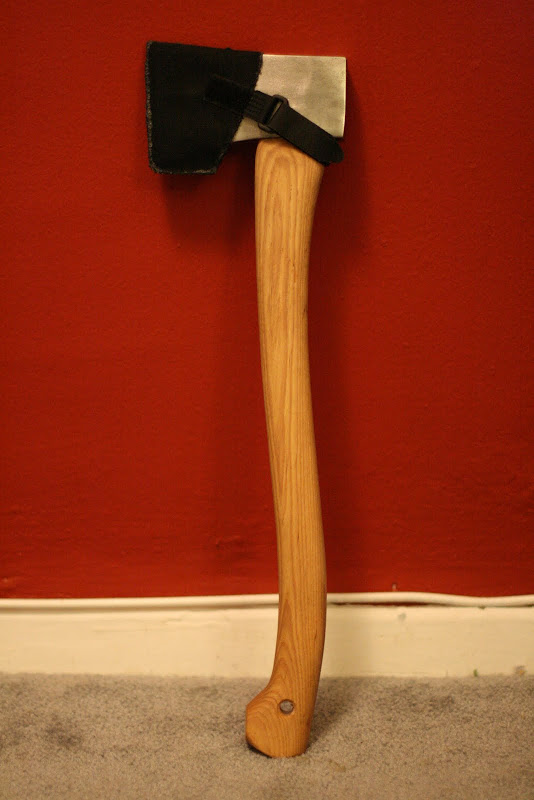We are all familiar with the Gransfors Bruks Small Forest Axe. It is arguably one of the most popular bushcraft tools, and is the axe of choice for many. One of the reasons why it has become so popular is that it is very compact and easy to carry. It has a head weight of 1.5lb and a handle length of about 20 inches. The big down side of the Gransfors Bruks Small Forest Axe is the price tag. It costs well over $100.00. For many it is worth the price, but not everyone can afford it.
That is why I decided to try to find a lower cost alternative, which would provide a reasonable level of performance. After a lot of searching, Ive reached the conclusion that there is no production axe other than the Wetterling ones, now also owned by Gransfurs Bruks which come close to the same specifications.
Recently I looked at the Collins Hunters Axe, but the quality was too low, and I found the 18 inch handle to be too short. For me, a small axe must have a handle of at least 20 inches. Snow and Nealley makes an axe with an 18 inch handle as well, but since Ive found that length handle to be too short, I will not be testing it. Besides, the Snow and Nealley is not cheap at all.
Since I was not able to find a low cost production alternative to the Small Forest Axe, I decided to look at old axe heads and see if a particular type can be refurbished. Unfortunately, most old axes are of the full axe type variety, with a head of over 3.5lb. There certainly arent enough 1.5lb heads out there for people to start refurbishing them.
I did however luck out during one of my hatchet tests. I tested the Northern Tool 24oz Camp Axe as a hatchet, but noticed that the head was 1.5lb. That was too heavy for a hatchet, but the quality of the head seemed good. That is why I decided to try to do some work to one of them and see if I can easily make a Small Forest Axe substitute from it. I know that not everyone has access to a workshop, expensive tools or specialized skills, so I wanted to get it done with just basic tools.
After some work, the finished product was this:

Specifications:
Manufacturer: Head by Northern Tool + Equipment, Handle by Gransfors Bruks
Axe Head Weights: 1.5 lb
Axe Length: 20 inches
Axe Head Material: Unknown carbon steel
Handle Material: American hickory
Cost: $23.00

Here is how I made it:
I took a Northern Tool 24oz Camp Axe. It cost me $10.00. I used a drill and a chisel to remove the head from the handle. It was very well glued so it took me some time to remove. I then used some sandpaper to remove all of the paint from the head.
One of the things that I noted during my review of the Northern Tool 24oz Camp Axe is that I thought the convex of the cutting edge itself was a bit too thick for my liking. The cheeks of the axe were the right thickness and the head overall had the right proportions, but the last 3/16 of an inch before the cutting edge was a bit thick. Im sure that for many that thickness would be fine because it makes the edge more durable, but for the high performance axe that I wanted, it was too thick.
I remedied the situation by filing it down a bit. I used a 200 grit 8 inch file to do the job. It took me about 15 minutes of work. I would strongly recommend getting a file if you will be doing any work with cheap axes. It makes the sharpening process much faster, and you can pick one up for about $3.00. I then used a set of sharpening stones to get it sharp enough to cut paper. The thickness with which I ended up was very similar to that of the Gransfors Bruks Wildlife Hatchet, and was noticeably thinner than the Gransfors Bruks Small Forest Axe (right).

Now that the head was ready, it was time to find a handle. I looked high and low for a good 20 inch handle, but could not find one. I eventually decided to just buy a Gransfors Brucks Small Forest Axe handle. They are very hard to find in the US. I found only one store that carried them, and they were selling them for about $45.00, way too much for the intended goal. In the end, I ended up buying it from a UK site for $13.00. When you are shipping it from over seas make sure to use airmail rather than UPS. If you use UPS, it will cost you over $30.00. It is a waste of money.
Now came the time consuming part. I spend about two hours sanding and filing the handle so it would fit well in the axe head. I didnt use any epoxy on the head itself, but I did use some to secure the wedge into the handle.
When the epoxy was dry, I took the axe into the woods for some testing. My hope was that I had made an axe that would not fall too far behind the Gransfors Bruks Small Forest Axe.

The result was shocking. The axe I made noticeably outperformed the Small Forest Axe. So much so, that I decided to go back to a location where I had done some testing with the Small Forest Axe on a piece of 3.5 inch hickory. The last time I tested it, it took me 60 seconds to chop through it with the Small Forest axe. It took me 45 seconds to go through it with the new axe.
I believe the added performance comes from the thinner grind of the new axe. It is still convexed, but comes very close to the grind of a competition axe. Of course, my worry was that because the edge was thinner, after being used in hard wood, it would dull very quickly. When I came home, I tested it on a piece of paper, and it had no problem cutting through it. That was after going through an 8 inch piece of oak.
The new axe is a bit more likely to stick to the wood than the Gransfors Bruks Small Forest Axe because it has more of a wedge shape, but I did a lot of chopping with it, and it was not a noticeable problem.
The balance of the axe is as good or better than the Gransors Bruks Small Forest Axe.

Other than the drill and chisel I used to remove the head from the old handle, these are all the tools I used to put together this axe: Gorilla glue epoxy, sandpaper, a 200 grit unidirectional grind 8 inch file, a hammer, and a set of sharpening stones.

I made a cheap sheath for it from some canvas material I had around.

The total cost was $23.00 and took me probably about five hours of work time to put together. This is not something that I do all the time, so my skill level is not high, nor did I use any special tools and equipment. The result is a $23.00 axe that can outperform the Gransfors Bruks Small Forest Axe. Try it for yourself and see.
That is why I decided to try to find a lower cost alternative, which would provide a reasonable level of performance. After a lot of searching, Ive reached the conclusion that there is no production axe other than the Wetterling ones, now also owned by Gransfurs Bruks which come close to the same specifications.
Recently I looked at the Collins Hunters Axe, but the quality was too low, and I found the 18 inch handle to be too short. For me, a small axe must have a handle of at least 20 inches. Snow and Nealley makes an axe with an 18 inch handle as well, but since Ive found that length handle to be too short, I will not be testing it. Besides, the Snow and Nealley is not cheap at all.
Since I was not able to find a low cost production alternative to the Small Forest Axe, I decided to look at old axe heads and see if a particular type can be refurbished. Unfortunately, most old axes are of the full axe type variety, with a head of over 3.5lb. There certainly arent enough 1.5lb heads out there for people to start refurbishing them.
I did however luck out during one of my hatchet tests. I tested the Northern Tool 24oz Camp Axe as a hatchet, but noticed that the head was 1.5lb. That was too heavy for a hatchet, but the quality of the head seemed good. That is why I decided to try to do some work to one of them and see if I can easily make a Small Forest Axe substitute from it. I know that not everyone has access to a workshop, expensive tools or specialized skills, so I wanted to get it done with just basic tools.
After some work, the finished product was this:
Specifications:
Manufacturer: Head by Northern Tool + Equipment, Handle by Gransfors Bruks
Axe Head Weights: 1.5 lb
Axe Length: 20 inches
Axe Head Material: Unknown carbon steel
Handle Material: American hickory
Cost: $23.00
Here is how I made it:
I took a Northern Tool 24oz Camp Axe. It cost me $10.00. I used a drill and a chisel to remove the head from the handle. It was very well glued so it took me some time to remove. I then used some sandpaper to remove all of the paint from the head.
One of the things that I noted during my review of the Northern Tool 24oz Camp Axe is that I thought the convex of the cutting edge itself was a bit too thick for my liking. The cheeks of the axe were the right thickness and the head overall had the right proportions, but the last 3/16 of an inch before the cutting edge was a bit thick. Im sure that for many that thickness would be fine because it makes the edge more durable, but for the high performance axe that I wanted, it was too thick.
I remedied the situation by filing it down a bit. I used a 200 grit 8 inch file to do the job. It took me about 15 minutes of work. I would strongly recommend getting a file if you will be doing any work with cheap axes. It makes the sharpening process much faster, and you can pick one up for about $3.00. I then used a set of sharpening stones to get it sharp enough to cut paper. The thickness with which I ended up was very similar to that of the Gransfors Bruks Wildlife Hatchet, and was noticeably thinner than the Gransfors Bruks Small Forest Axe (right).
Now that the head was ready, it was time to find a handle. I looked high and low for a good 20 inch handle, but could not find one. I eventually decided to just buy a Gransfors Brucks Small Forest Axe handle. They are very hard to find in the US. I found only one store that carried them, and they were selling them for about $45.00, way too much for the intended goal. In the end, I ended up buying it from a UK site for $13.00. When you are shipping it from over seas make sure to use airmail rather than UPS. If you use UPS, it will cost you over $30.00. It is a waste of money.
Now came the time consuming part. I spend about two hours sanding and filing the handle so it would fit well in the axe head. I didnt use any epoxy on the head itself, but I did use some to secure the wedge into the handle.
When the epoxy was dry, I took the axe into the woods for some testing. My hope was that I had made an axe that would not fall too far behind the Gransfors Bruks Small Forest Axe.
The result was shocking. The axe I made noticeably outperformed the Small Forest Axe. So much so, that I decided to go back to a location where I had done some testing with the Small Forest Axe on a piece of 3.5 inch hickory. The last time I tested it, it took me 60 seconds to chop through it with the Small Forest axe. It took me 45 seconds to go through it with the new axe.
I believe the added performance comes from the thinner grind of the new axe. It is still convexed, but comes very close to the grind of a competition axe. Of course, my worry was that because the edge was thinner, after being used in hard wood, it would dull very quickly. When I came home, I tested it on a piece of paper, and it had no problem cutting through it. That was after going through an 8 inch piece of oak.
The new axe is a bit more likely to stick to the wood than the Gransfors Bruks Small Forest Axe because it has more of a wedge shape, but I did a lot of chopping with it, and it was not a noticeable problem.
The balance of the axe is as good or better than the Gransors Bruks Small Forest Axe.
Other than the drill and chisel I used to remove the head from the old handle, these are all the tools I used to put together this axe: Gorilla glue epoxy, sandpaper, a 200 grit unidirectional grind 8 inch file, a hammer, and a set of sharpening stones.
I made a cheap sheath for it from some canvas material I had around.
The total cost was $23.00 and took me probably about five hours of work time to put together. This is not something that I do all the time, so my skill level is not high, nor did I use any special tools and equipment. The result is a $23.00 axe that can outperform the Gransfors Bruks Small Forest Axe. Try it for yourself and see.
